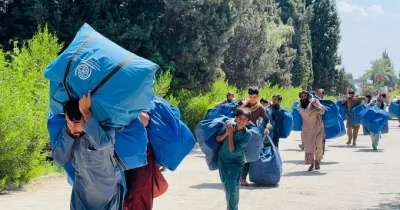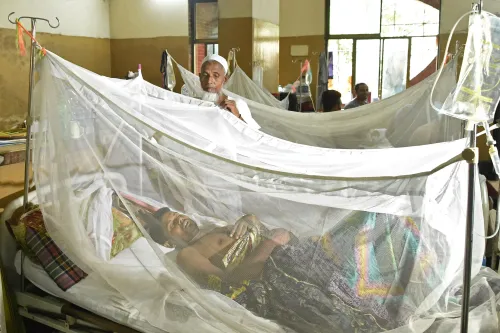What is the situation for the nearly 1.2 million Afghans returning home from Pakistan since September 2023?

Synopsis
Key Takeaways
- 1.2 million Afghans have returned from Pakistan since September 2023.
- Many returnees face severe hardships and lack basic necessities.
- Over 156,000 returnees have received humanitarian assistance.
- The WHO has reported rising health issues among deported Afghans.
- Urgent international aid is needed to prevent a humanitarian crisis.
Kabul, August 1 (NationPress) Close to 1.2 million Afghans have returned from Pakistan since September 2023, as reported by the United Nations High Commissioner for Refugees (UNHCR). The agency highlighted that many of these returnees are enduring severe hardships and have urgently requested aid to avert a worsening humanitarian catastrophe.
Since their return to Afghanistan, over 156,000 returnees, which includes 98,000 registered cardholders, have received humanitarian support. The UNHCR noted that women and girls constitute approximately half of those receiving assistance, while around 2.2 percent of all returnees are individuals with disabilities, as reported by Khaama Press.
The agency further revealed that more than 315,000 Afghans returned to their homeland in 2025 alone, among them 51,000 who were forcibly deported by Pakistani authorities. The increasing political and security pressures in Pakistan threaten the status of over two million Afghan refugees who have lived there for decades.
The report indicates that many Afghan returnees are facing grim circumstances, lacking adequate housing, employment, and access to vital services in Afghanistan. Humanitarian organizations have urged Afghan authorities and the international community to bolster support, cautioning that this influx of returnees could exacerbate the humanitarian crisis in Afghanistan if assistance is not rendered.
Earlier this month, the World Health Organisation (WHO) issued a warning regarding the rising spread of infectious diseases and poor sanitary conditions among Afghan migrants deported from neighboring countries. The WHO reported an uptick in respiratory infections, diarrhea, skin conditions like scabies, and suspected cases of Covid-19 among deported Afghan migrants.
Ground assessments at critical border points, particularly Islam Qala in Herat Province, reveal that upper respiratory infections are the most prevalent health issues faced by deported Afghans, followed closely by diarrhea and dehydration, especially among children and the elderly. Cases of scabies and Covid-19 have also been documented among Afghan returnees.
In response, the WHO has initiated emergency health screenings and mass vaccination campaigns in collaboration with local health authorities at the Islam Qala and Spin Boldak border crossings. These efforts aim to prevent further outbreaks and provide essential care to vulnerable populations. Approximately 29,000 individuals have been screened or vaccinated at major border points, including Islam Qala, Torkham, and Spin Boldak. Additionally, WHO mobile health teams are deployed at reception centers and zero-point borders, conducting daily health checks on hundreds of deported Afghans.









